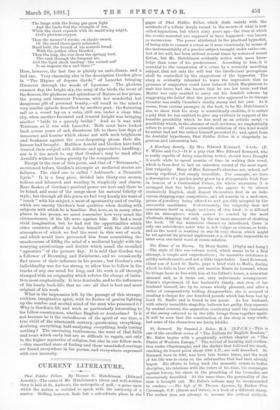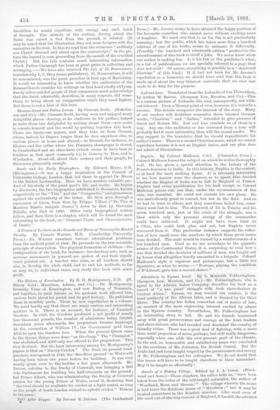St. Bernard. By Samuel J. Eales, M.A. (S.P.C.K.)—This is one
of the excellent series of "The Fathers for English Readers." Mr. Eales begins with a graphically written chapter on " The States of Western Europe." The revival of learning and civilisa- tion under Charlemagne, and the decline that followed his death, reaching its lowest point about 1000 A.D., are well described. St. Bernard, born in 1091, was born into better times, and the work of his life was to carry on the reformation that had been already begun. His efforts to bring back the monastic orders to better discipline, his relations with the rulers of his time, his campaigns against heresy, his share in the preaching of the Crusades, are successively described. At the same time, the personality of the man is brought out. Mr. Bales's volume may be recommended to readers.—The Life of St. Thomas Aquinas, by Father Pius Cavanagh, O.P. (Burns and Oates), is a book of a different stamp. The author does not attempt to assume the critical attitude. Doubtless he would repudiate with energy any such habil, of thought. The miracle of the ecstasy, during which the Saint was raised a foot from tho ground, is related. (It nay be noted that the illustration does not seem to agree with the narrative in the text. In this we read that the witnesses " suddenly saw Christ descend and stand upon the manuscript ;" in the pic- ture the legend is seen proceeding from the mouth of the crucified Christ.) But the Life contains much interesting information which Father Cavanagh has been at great pains in collecting and arranging.—We have also received The Life of St. Bonaventure, translated by L. C. Skey (same publishers). St. Bonaventure, it will be remembered, was the great preacher in that age of Mariolatry.
It would be interesting to know whether the authorities of the Roman Church consider his writings on that head wholly edifying.
Surely sober-minded people of that communion must acknowledge that the Saint, admirable, doubtless, in many respects, did some- thing to bring about an exaggeration which they must deplore. But there is not a hint of this here.



































 Previous page
Previous page